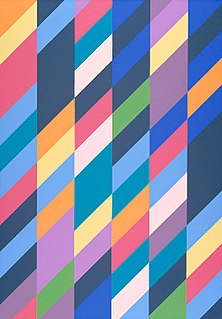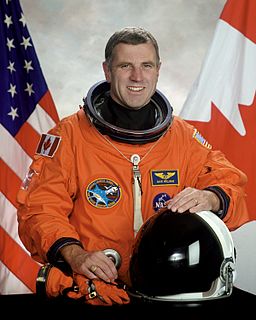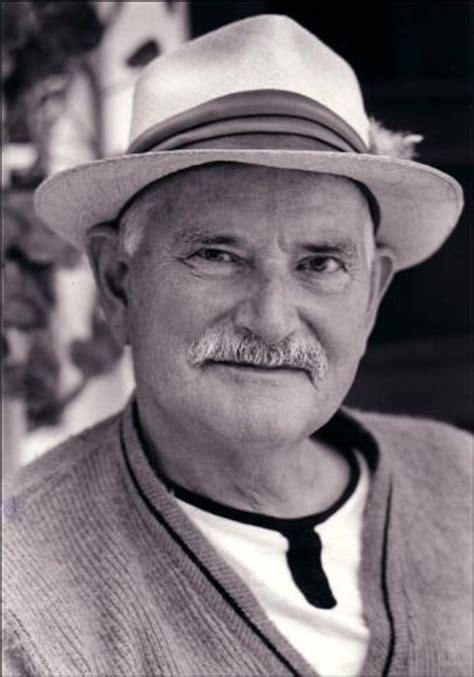A Quote by Henry David Thoreau
Perchance, coming generations will not abide the dissolution of the globe, but, availing themselves of future inventions in aerial locomotion, and the navigation of space, the entire race may migrate from the earth, to settle some vacant and more western planet.... It took but little art, a simple application of natural laws, a canoe, a paddle, and a sail of matting, to people the isles of the Pacific, and a little more will people the shining isles of space. Do we not see in the firmament the lights carried along the shore by night, as Columbus did? Let us not despair or mutiny.
Quote Topics
Abide
Aerial
Along
Application
Art
Carried
Columbus
Coming
Despair
Did
Dissolution
Earth
Entire
Firmament
Future
Generations
Globe
Inventions
Laws
Let Us
Lights
Little
May
Migrate
More
Mutiny
Natural
Natural Law
Natural Laws
Navigation
Night
Pacific
Paddle
People
Planet
Race
Sail
See
Settle
Shining
Shore
Simple
Some
Space
Themselves
Took
Us
Vacant
Western
Will
Related Quotes
And then, the Earth being small, mankind will migrate into space, and will cross the airless Saharas which separate planet from planet and sun from sun. The Earth will become a Holy Land which will be visited by pilgrims from all the quarters of the Universe. Finally, men will master the forces of Nature; they will become themselves architects of systems, manufacturers of worlds.
There is beauty in space, and it is orderly. There is no weather, and there is regularity. It is predictable. Just look at our little Explorer; you can set your clock by it-literally; it is more accurate than your clock. Everything in space obeys the laws of physics. If you know these laws, and obey them, space will treat you kindly.
A little more patience, a little more charity for all, a little more devotion, a little more love; with less bowing down to the past, and a silent ignoring of pretended authority; brave looking forward to the future with more faith in our fellows, and the race will be ripe for a great burst of light and life.
In my earlier paintings, I wanted the space between the picture plane and the spectator to be active. It was in that space, paradoxically, the painting 'took place.' Then, little by little, and to some extent deliberately, I made it go the other way, opening up an interior space... so that there was a layered, shallow depth.
On my second space walk, I was riding the Canadarm, heading down toward the payload bay of the space shuttle, and I could see the space shuttle highlighted against the Earth in the background, and there was this black, infinite, hostile void of space. I remember looking down at the Earth and thinking, "Beneath me is a 4½-billion-year-old planet, upon which the entire history of the human species has taken place." That was an incredibly humbling moment, and I had a bit of an epiphany.
A new space race has begun, and most Americans are not even aware of it. This race is not about political prestige or military power. This new race involves the whole human species in a contest against time. All of the people of the Earth are in a desperate race against disaster... To save the Earth we must look beyond it, to interplanetary space. To present the collapse of civilization and the end of the world as we know it, we must understand that our planet does not exist in isolation.
Well, gentlemen, do you believe in the possibility of aerial locomotion by machines heavier than air? ... You ask yourselves doubtless if this apparatus, so marvellously adapted for aerial locomotion, is susceptible of receiving greater speed. It is not worth while to conquer space if we cannot devour it. I wanted the air to be a solid support to me, and it is. I saw that to struggle against the wind I must be stronger than the wind, and I am.
...We're allotted a little space on earth and that we survive in that wilderness that can take back what it has given, as easily as blowing its breath on us or sending the sea to tell us we are not so big. When we forget how close the wilderness is in the night, my grandpa said, someday it will come in and get us, for we will have forgotten how terrible and real it can be.
Our civilization has fallen out of touch with night. With lights, we drive the holiness and beauty of night back to the forests and the sea; the little villages, the crossroads even, will have none of it. Are modern folk, perhaps, afraid of night? Do they fear that vast serenity, the mystery of infinite space, the austerity of stars?
I expect to see the coming decades transform the planet into an art form; the new man, linked in a cosmic harmony that transcends time and space, will sensuously caress and mold and pattern every facet of the terrestrial artifact as if it were a work of art, and man himself will become an organic art form.
I think art world will have consolidated, I think it will slow down a little bit. I think it will be less white and Western, which it is still at the moment. There will be more female artists in the mix. I think we'll see art forms explored through different media - the Internet, television, books, even. We'll see art produced in forms and media that we haven't seen yet.
The future is about wings and wheels and new forms of space transportation, along with our deep-space ambition to set foot on another world in our solar system: Mars. I firmly believe we will establish permanence on that planet. And in reaching for that goal, we can cultivate commercial development of the moon, the asteroid belt, the Red Planet itself and beyond.



































